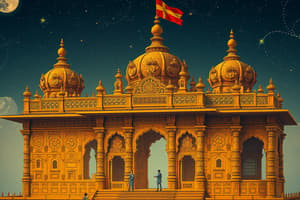Podcast
Questions and Answers
Who founded the Maurya Empire in ancient India?
Who founded the Maurya Empire in ancient India?
- Ashoka the Great
- Pallava Dynasty
- Satavahana Dynasty
- Chandragupta Maurya (correct)
During which period did the Maurya Empire rule in ancient India?
During which period did the Maurya Empire rule in ancient India?
- 100-50 BCE
- 500-400 BCE
- 321-185 BCE (correct)
- 200-100 BCE
Which emperor succeeded Chandragupta Maurya?
Which emperor succeeded Chandragupta Maurya?
- Gupta Empire
- Ashoka the Great (correct)
- Satavahana Dynasty
- Kushan Empire
Which empire is often referred to as the Golden Age of India?
Which empire is often referred to as the Golden Age of India?
In which century did the Gupta Empire rule in ancient India?
In which century did the Gupta Empire rule in ancient India?
Which ancient Indian ruler adopted Buddhism as his state policy?
Which ancient Indian ruler adopted Buddhism as his state policy?
Which dynasty is credited with establishing the first university in Nalanda?
Which dynasty is credited with establishing the first university in Nalanda?
Who was the notable Kushan ruler known for patronizing Buddhist scholars resulting in the spread of Mahayana Buddhism?
Who was the notable Kushan ruler known for patronizing Buddhist scholars resulting in the spread of Mahayana Buddhism?
Which dynasty introduced copper coins in India and established a gold coinage system for the first time?
Which dynasty introduced copper coins in India and established a gold coinage system for the first time?
Which dynasty contributed significantly to temple architecture using the Dravidian style?
Which dynasty contributed significantly to temple architecture using the Dravidian style?
The revival of Hinduism in all forms, both Shaivite and Vaishnavite, occurred during the reign of which ruler?
The revival of Hinduism in all forms, both Shaivite and Vaishnavite, occurred during the reign of which ruler?
Which empire ruled from the northwestern part of the Indian subcontinent and was responsible for establishing Buddhism in Gandhara?
Which empire ruled from the northwestern part of the Indian subcontinent and was responsible for establishing Buddhism in Gandhara?
Study Notes
Ancient India
The history of ancient India is characterized by various distinct empires and dynasties. Each period has its own unique contributions to Indian culture, art, science, philosophy, religion, politics, economics, trade, society, and military power. Some prominent ancient Indic civilizations and their respective ruling houses include the Maurya Empire, Gupta Empire, Pallava Dynasty, Kushan Empire, and Satavahana Dynasty.
Maurya Empire
The Maurya Empire, established by Chandragupta Maurya, is considered one of the most powerful empires in ancient India. It ruled from the Magadha region between 321-185 BCE. The Maurya Empire expanded across the Indian subcontinent, bringing the whole of India under a single rule for the first time. Chandragupta was succeeded by Ashoka the Great, who ruled from 268 BCE to 232 BCE. Ashoka's empire extended over almost half of what is now India, Pakistan, Nepal, Afghanistan, Bangladesh, Bhutan, and parts of Myanmar. He adopted Buddhism as his state policy and promoted it through edicts and by sending missionaries to Sri Lanka, Southeast Asia, Egypt, Syria, and Greece.
Gupta Empire
The Gupta Empire emerged after a significant decline of the Maurya Empire and ruled between the late fourth century CE to the mid-sixth century CE. It is often referred to as the Golden Age of India due to its artistic, cultural, scientific, and economic achievements. The most famous rulers of this era were Chandragupta II Vikramaditya, Skandagupta, Kumaragupta I, and Purugupta. During this time, India attained great prosperity, which led to a revival of Hinduism in all forms, both Shaivite and Vaishnavite. The Guptas established the first university in Nalanda, where learning flourished for centuries and attracted students from far beyond the borders of India.
Pallava Dynasty
The Pallava Dynasty originated in Tamil Nadu and ruled the region between the second century CE to the ninth century CE. This dynasty played an important role in the development of a local Chola kingdom. Pallava kings such as Paramesvaravarman, Mahendravarman, Neelamega Perumal, and Rajasimha made significant contributions to temple architecture, using the Dravidian architectural style. The Pallava Dynasty also contributed to the development of the Tamil language, literature, and music.
Kushan Empire
The Kushan Empire existed during the Parthian era and ruled from the northwestern part of the Indian subcontinent between 30 - 60 CE. The Kushans were responsible for establishing Buddhism in Gandhara. One of the most notable Kushan rulers, Kanishka, patronized Buddhist scholars from the north and south, which resulted in the spread of Mahayana Buddhism throughout East Asia.
Satavahana Dynasty
The Satavahanas, also known as the Andhras, ruled the Deccan plateau between the second century BCE to the third century CE. They built large cities like Pratishani, Junnar, Amaravati, and Sagala. The Satavahana Dynasty introduced copper coins in India and established a gold coinage system for the first time. Their dominance allowed them to establish links with the Roman Republic, which led to a considerable influx of Greek culture into India.
Studying That Suits You
Use AI to generate personalized quizzes and flashcards to suit your learning preferences.
Description
Test your knowledge on ancient Indian civilizations and dynasties, including the Maurya Empire, Gupta Empire, Pallava Dynasty, Kushan Empire, and Satavahana Dynasty. Learn about their contributions to Indian culture, art, religion, politics, and more.




